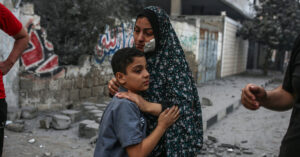In times of overwhelming adversity, like the tragedy in Palestine, reconnecting with our faith and the promise of Imam Mahdi and Prophet Isa offers solace and a reminder of Allah’s ultimate justice.
Embracing Hope: Why Muslim Families Should Build a Connection With Imam Mahdi & Prophet Isa

In an era where the airwaves are saturated with images of violence and oppression, particularly the heart-wrenching scenes from Palestine, Muslim families find themselves searching for a sliver of hope amidst despair. This yearning for peace and justice turns many towards the teachings of Islam, which foretell the coming of Imam Mahdi (AS) and Prophet Isa (AS) — figures of salvation who are prophesied to fill the world with justice as it is filled with injustice. For parents, this pivotal aspect of Islamic belief offers a profound opportunity to teach resilience and nurture faith in the divine promise.
The Context of Current Events
As the global Muslim community grapples with the unfolding tragedy in Palestine, where over 10,000 lives have been claimed by relentless conflict, the echoes of sorrow and outrage resonate in every household. This tormenting reality begs for a divine intervention, and herein lies the significance of instilling an understanding of Islamic eschatology in our families — to reaffirm that Allah’s justice prevails, and that the saviors of humanity will indeed return.
Islamic Eschatology: A Twin Promise
Islamic eschatology is rich with narratives of redemption and hope. Both Sunni and Shia Muslims hold fast to the belief that the end of times will witness the emergence of Imam Mahdi (AS), a divinely guided leader who will restore righteousness. Alongside him, Prophet Isa (AS), known in Christianity as Jesus, will return, not as a messenger, but as a restorer of faith and a pivotal player in the fight against falsehood.
Imam Mahdi in Islamic Beliefs
For Shia Muslims, Imam Mahdi (AS) is already among us, albeit in occultation, awaiting the divine command to begin his mission. Parents teach their children about his just leadership and the importance of preparing for his return through acts of piety and social justice. Sunni Muslims, while they may not share the belief in his current existence, await a Mahdi who is yet to be born or revealed, emphasizing the importance of readiness for his advent through individual reform and communal solidarity.
Prophet Isa’s Role: A Universal Hope
The return of Prophet Isa (AS) holds a special place in Islamic tradition, transcending sectarian divides. His coming signifies a turning point in human history — an era of unparalleled peace and unity. By understanding his role, Muslim families can instill in their children the values of tolerance and harmony, vital for the multicultural, multi-faith world they inhabit.
Practical Parental Guidance
In practical terms, discussing the roles of Imam Mahdi (AS) and Prophet Isa (AS) with children requires sensitivity. Parents can draw parallels between the struggles faced by these figures and the current events, using them as lessons in perseverance and faith. It’s about creating a narrative that combines history with present-day challenges, encouraging children to be agents of change and goodness, just as Imam Mahdi (AS) and Prophet Isa (AS) are destined to be.
The Role of Prayer and Reflection
Encouraging a routine of prayer and reflection can provide a sanctuary for families amidst chaos. Turning to Allah in moments of silence, reciting Dua, and meditating on the lives of these prophesied leaders can foster a sense of inner peace, known in Arabic as ‘sakoon’. This practice not only aids in managing grief but also in building a spiritual connection that uplifts the soul and strengthens resolve.
As we navigate through these tumultuous times, the stories of Imam Mahdi (AS) and Prophet Isa (AS) serve as beacons of hope. By educating our children on their significant roles, we can cultivate an unwavering faith in Allah’s promise and prepare the young hearts and minds for a future that celebrates divine justice and enduring peace. As Muslim parents, our duty extends beyond the present; it’s about laying the groundwork for a generation that will witness the dawn of an era marked by the presence of these extraordinary leaders.


